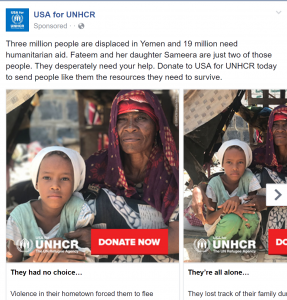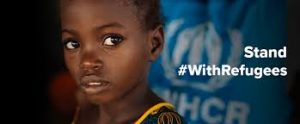Human Capital: What Does It Mean?
From the start of the focus on displaced people post-World War II, the economic potential of migration has consistently been a focus of Eurowestern powerhouses. Even though the UNHCR may advertise with themes of generosity, inhumane refugee situations have been exacerbated through outsourcing of “developmental aid” in the Moroccan, Libyan, and Turkish outskirts for primarily political reasons outlined in Didier’s Hot Spots.


Facebook advertisements from the USA for UNHCR page.
Those who are proven or seen to be more useful are sent to countries of relocation, but the remaining 80% who fail to be considered refugees/asylumees are sent into a erasure that invalidates both their functionality and humanity. Used as cheap labor, Alphonse in Alexander’s Treacherous Journey provides a peek of what it means to be given hope of such confirmation, only to lose it again.
Perhaps it shows how the intersection of not only our vulnerabilities but also others’ biases influence how we are discriminated. If 20% of Sub-Saharan Africans versus 80% of Syrians are accepted, we can only ponder the reasons for the difference. Is it colorism? What about the size of the original country’s population? Is it of the media’s prioritization of wars? I can only imagine if million-dollar investments can influence one’s visa application and countries look for cheap labor for their struggling economies, that “human capital” is majorly defined by its latter word and the history of colonialism. The lack of visibility and importance given to Alphonse’s inaccurate deportation emphasizes the ironic removal of human from “human capital” when we only hold our vulnerabilities. I share the same hope for these migrants that they reach a better place, but depending their lives on whatever are “hot topics” in the humanitarian world when they reach “hot spots” is limiting in terms of efficacy and ethics.
Recent Comments